#eco-anxiety
Quote
When consumers are told they are equally to blame for the climate crisis (a narrative conveniently crafted by the fossil fuel industry) but face a dearth of options for actually leading a more climate-friendly life, it’s all too easy to convince people to feel guilty merely for living.
The New Republic
476 notes
·
View notes
Text
"come to terms - to quote Dave Ramsey - with the ridiculousness of a life spent buying "things we don't need with money we don't have to impress people we don't like." "
50 notes
·
View notes
Text
Someday I'd like to draw some comic about my experience of becoming very aware and informed of the state of our planet and our living conditions (and how everything is tied with political choices at the end of the day).
All those feelings I can't explain would be easier said with just some doodled scenes.
It would also be my personal path through it. People live it differently, even if some things are going to be similar. But I've always been a ball of stress and anxiety; and as such, they're obviously part of how I live this awareness.
It's been three years, and every now and then I still find myself unable to share when I feel alone in this. When I'm facing daily life situations where there's a problem with what we're doing or choosing to do but I'm, like, the only one seeing/thinking about it. And there's the fear that if I say something, I'll be seen as the annoying, aggravating person.
And those times when a situation or a topic makes me real uncomfortable, or even anxious, ecologically-wise, but it's transparent for the others; family included. They may have no idea that said topic can make me anxious, or maybe don't care so much, maybe they would even think I'm overdoing it with all this anyway? Again, I don't want to be the party boomer, so most of the time I don't say it and stay anxious on my own.
I think those are the worst. Sometimes my social anxiety may be harder to deal with than my projections for the future (which are still hard to imagine while we're not there, you know). Because if people, here and now, don't see the problem and don't see what needs to change to the level required, those projections are bound to happen, you know?
If we were all (or almost) going on the right path, it would open the way to hope. But having to talk to people, convince them, especially when the change needed may touch to some extent our personal lives/beliefs/dreams/interests? It goes not only into technical and science and datas talk, but also very much into political and personal talk. And that's terrible for me, who fear that people will hate me over the tiniest thing.
So anyway idk sometimes I just imagine the kind of scene I could draw about my most common anxiety in common situations. And that with this I could at least, idk, tell the people around me how I feel in some situations through a smoother, easier medium for me (and even maybe for them).
And at the same time, I would do better to use this time and effort to work on a (maybe) more useful project on those topics. That's probably the best choice to help myself in the end.
Yep I ranted about all that just to conclude that I won't do it (but at the same time who knows!)
#trs life#doing the things in my reach are the only things i can do#even if i dream everyday that this isn't true#eco-anxiety
7 notes
·
View notes
Text
Climate change is a mental health issue
And part of a solarpunk present…
Content warning: this article briefly talks about depression, suicide, and self-harm
In the course of researching for my thesis, I read a lot of things: scholarly books, articles, essays… but also lots of pulpy science fiction (of course), and also a lot of recent online articles (usually news or journalism) about climate change and its effects.
The recent essays and articles that I read had a fascinating overlap: they were talking about climate, but they were also talking about mental health. Mental health issues such as depression and anxiety are a natural corollary of experiencing the climate changing.
(I have my own thoughts about how that leads to the very concept of the climate, or the environment more broadly, being a mental untouchable or taboo topic, that many peoples’ thoughts automatically shy away from; a way that their minds are helping to insulate and protect them from a negative psychosomatic experience. Thus, why it can be so difficult for many to address climate change because our very minds are refusing to allow us to face the scary thing directly, because it kicks up such a strong instinctual fight/flight/freeze response. But, this is a tangent, and one I am extremely underqualified to take. Someone call in some psychologists…)
Back in 2005, philosopher Glenn Albrecht coined the term “solastalgia”, which is a neologism that, according to the author in a 2007 article for PubMed, operates
As opposed to nostalgia--the melancholia or homesickness experienced by individuals when separated from a loved home--solastalgia is the distress that is produced by environmental change impacting on people while they are directly connected to their home environment.
When I started researching (only 8 years ago!), this was one of the only publicly accessible and known terms (in English) outside of a specific niche of (western) academia to describe this phenomenon of the way that climate change can be pretty entwined with significant mental health issues.
Albrecht is Australian. He used the examples of open-pit coal mining, or deforestation. In the almost twenty years since that publication, I think the global community can add phenomena such as catastrophic wildfires, persistent and ruinous sea-level rise, tailing ponds spillage, industrial water poisoning, widespread drought, melting permafrost, century floods, and more to that list.
This is part of why I was so keen to do an interview about climate grief chaplaincy, which I had never heard of before. Even now, only two years later, therapists and psychologists are starting to advertise climate-focused services. On the one hand, I am so very glad that assistance is being offered to those who need it. On the other, I’m big mad about how, yet again, the issue of climate change is being framed as an individual problem.
At least chaplaincy is very conscious of community—as Gabrielle explains in the episode, there is a strong tradition of movement chaplaincy among activist groups in the so-called United States that is tuned into a more collective experience and casts climate change in that light (more appropriately, I feel).
Solarpunk’s dream of a just, sustainable future isn’t solely for bodies. There’s an aspect of being human - our mind, our mental health, our intangible selves, our spirit, what some would call our soul - that merits careful attention as well. I imagine that any community that is truly solarpunk pays just as much attention to what cannot be quantified about the human experience as what can be.
And if we are to have a hope of attaining that care-ful attention to the human being as a whole, it would behoove us to begin practicing thinking about, caring for, and paying attention to that aspect of our selves in the present day.
One way to do this would be for any climate journalism, going forward, to include links and references to local climate helplines, actions, and groups as relevant to the discussion in the article, in the same way that articles dealing with suicide, self-harm, depression, and other extremely difficult topics are already doing.
Realizing the mental toll that a swiftly-changing-for-the-worse climate has on readers, especially young people, is to my mind a journalistic duty of care. It has been shown many times that an important mitigating factor of climate anxiety and climate grief is the chance afforded to do something, to act on the knowledge that the reader has just learned. Another huge mitigating factor is not feeling alone in the face of overwhelming odds and at the mercy of negative feelings.
In the midst of my studying, I began to volunteer at my local food bank, for example. Being in the community and having a tangible way to help other humans (and knowing that I was helping to ease their burdens of anxiety and stress, as well as cope with the food shortages induced by climate change and lend a hand to an organization struggling to help its members) was extremely helpful in mitigating my own dark night of the soul of post-apocalyptic despair and grief in that moment.
Did it solve everything? Nope. Did it make my climate anxiety disappear? Not a chance. But it helped ease it generally, and for four hours a week it banished my anxieties around the climate almost completely; in my experience, it’s hard to feel shitty when I’m not afforded the luxury of dread, but instead am in the midst of facing (a corner of) the issue head-on.
I discovered solarpunk on Tumblr back in the twenty-teens, and I was hooked. Part of why I like solarpunk so much is the emphasis on doing what you can, when you can, to make things better now - even if it’s just the corner of the neighbourhood you live in. The effect on mental health of even just picking up litter can be tremendous. Another reason I’m such a fan of solarpunk is that it is a shared experience, one where terms like ‘climate grief’ and ‘climate anxiety’ aren’t up for debate but instead are nuanced and treated seriously, and it is a diverse community to be part of, one that continually evolves and changes and isn’t afraid to have difficult conversations, respectuflly. Access to feeling better in the face of the denial and despair of the Anthropocene should be available to everyone, no matter where they are or who they are.
What do you do to mitigate your own negative climate emotions? I’m no longer able to volunteer at that food bank (I moved, and now I can’t lift things for health reasons, it’s a whole thing…), but I’m part of my local community garden, which helps to mitigate food scarcity and improve neighbourhood resiliency and community. Tell me what you get up to, or hope to get up to in future!
#solarpunk#solarpunk presents#climate change#climate#climate grief#climate anxiety#eco-grief#eco-anxiety#mental health#journalism#volunteering#activism
5 notes
·
View notes
Text
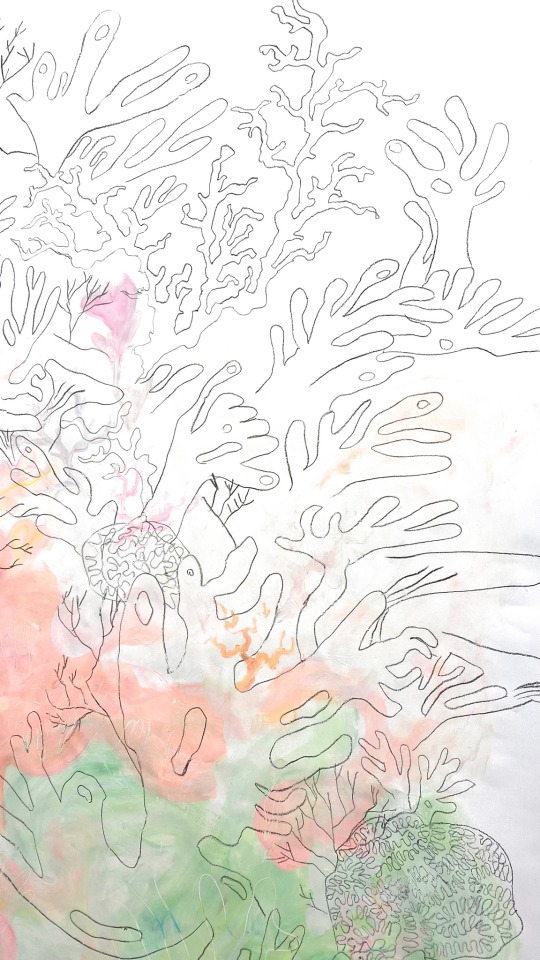


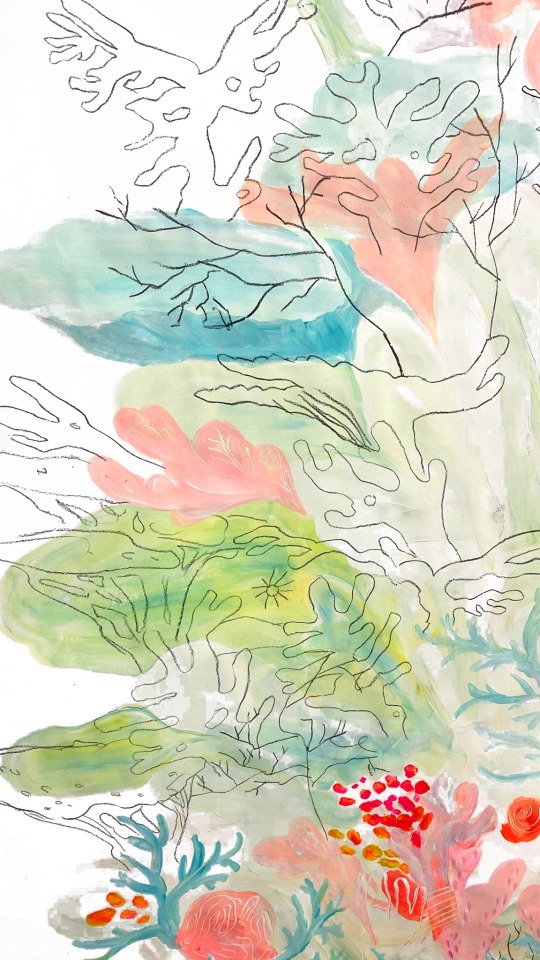
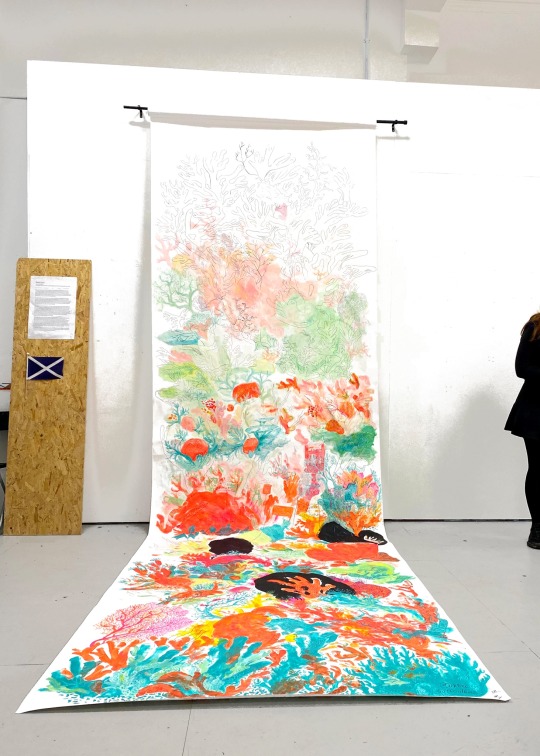
Coral goes white before it dies
With Diana Kristin Bechmann in Glasgow for Cop26, acrylics and pencil on paper, November 2021
#contemporary art#contemporary painting#painting#drawing#eco-anxiety#eco anxiety#climate change#eco anxiety Art#corals#nature#illustration#Ffoulkes#art#color#colour#colors#Glasgow#cop26 Glasgow#Glasgow cop26#cop26#Art in Glasgow
10 notes
·
View notes
Text
It’s interesting to me the connection between:
-anthropogenic (human-caused) climate change
-ecological grief (aka climate grief or eco-grief)
-eco-anxiety
-the future amount of people in STEM
-and the happiness of those who are in STEM.
Some definitions so everyone can understand:
Anthropogenic Climate Change: Changes to the Earth’s climate and ecosystems which are caused by human activity, both directly and indirectly.
Ecological Grief: “The grief felt in relation to experienced or anticipated ecological losses, including the loss of species, ecosystems, and meaningful landscapes due to acute or chronic environmental change.”
Eco-Anxiety: Extreme worry about current and future harm to the environment caused by human activity and climate change.
Here’s the thing: You generally cannot go into the sciences right now without hearing about climate change every day. Here’s what I saw/experienced in my first year of College.
Generally in university, in General Biology 1, you learn about how changes in temperature and acidity can cause vital proteins to stop working, and the potential ecological repercussions of this are usually discussed at least somewhat. In General Biology 2 there is usually an ecology unit, which goes into how we study ecosystems, biomes, communities, etc. the different kinds of each, and broadly goes over how humans are affecting them.
In my Intro to Geology course it was talked about a bit, with discussions of where and how we get coal, oil, and gas. We also spent some days watching a particular documentary series called “Earth: The Power of the Planet” (presented by Iain Stewart) and that brought up a lot of important things about climate change.
In both my Geography courses we learned/heard about climate change pretty much every day, and that’s not a huge surprise as one of them was about meteorology and climatology, so it’s pretty fundamental to the field.
But even if you’re not taking these kinds of courses where it is brought up regularly, there are posters and flyers posted all over campuses, depending on the school you might also get notices relating to climate change in your email, there was a slide show that played on a small tv outside the Geology & Geography Department, which is right in front of the stairs to that floor, that included this image.
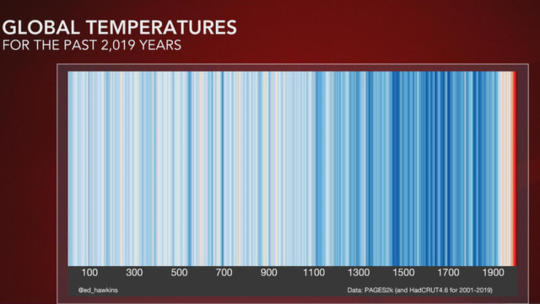
If you’re going to my school to study fashion, at least a couple of your classes are also on that floor, and you walk past this at least a few times a week, so even STEM students who are going into fields that are not centred around or related to biology or ecology hear about, learn about, or experience climate change issues.
And I am not saying that the amount of education or awareness being spread about climate change is a bad thing, we should not stop talking about climate change and the effects thereof; because this is a reality and if people are going to go into these kinds of fields they have to know what’s happening and what’s changing.
What I am saying however, is that this is having an effect on people’s mental health. The people who need to know this info the most, and are most likely going to have to do the most about this, are also the people being so bogged-down by the weight of it, the pain of it, the hopelessness, grief, anxiety, and fear of it, that it’s hurting them. And here’s the problem with having to get up 4-5 days a week and go to campus, get told the horrors of the world and uncertainty of our future, and then go home and continue to study, memorize, and understand the mechanisms for how the human race is destroying the planet and the conditions that made them and allowed them to thrive before making dinner, and then get up and study that all again on the weekends: it’s really really depressing.
It causes those phenomena I mentioned at the beginning, eco-grief and eco-anxiety, as well as a bunch of similar things, people being psychologically impacted by climate change. Psychologists have been observing and giving different names to these things, like the previously mentioned, as well as ecoguilt, solastalgia, biospheric concern, etc.
And let’s be real here for a moment, getting a degree in anything isn’t a smooth ride, it’s not easy and it’s rarely super fun. (Though it can have its moments) However, adding these kinds of psychological issues to the mix is going to increase the rate at which students give up on getting these degrees and try to pursue something that doesn’t make them feel the crushing weight of what feels like the “inevitable” demise of the human species all the time. So my theory is that this will decrease the number of STEM majors (primarily in ecology, geography, biology, and related subjects) who graduate and go on to work in their field.
But for those that push through and want this degree and want to do this work no matter the news they have to hear to get there, or those who just manage to withstand the mental and emotional pain cause by climate change long enough to finish a degree and/or get a job, the effects are still there. My theory is that this will make these people far “less happy” overall, just from regularly having to hear about, witness, study, report on, understand, or teach about climate change. (“Less happy” being pretty vague, I’m using it to generalize higher levels of feelings of loss or grief, anxiety, depression, emotional distress, etc.)
According to this article (https://www.frontiersin.org/articles/10.3389/fpsyt.2020.00074/full) “acute events” (meaning sudden, short, but extreme events of climate change) can cause reactions in people that “act through mechanisms similar to that of traumatic stress,” and people who actively study these events and issues are more likely to witness these events at all, will witness them more often, and will have a deeper understanding of the severity. So an event which the average person may perceive as sudden, short, but simply just sad and not very extreme; is likely to be far better understood by these professionals, who would then perceive it as far more extreme, resulting in it being an acute event, and causing that kind of psychological response.
In summary, it is emotionally and mentally painful to study the sciences during this time of anthropogenic climate change. Increased understanding on the severity of climate change events, witnessing them more frequently, and having to work with/study them regularly as part of one’s education or career, worsens the negative psychological impact these events can have on one’s mind. This makes students in the sciences more stressed and unhappy, which decreases the likelihood that those students will graduate and/or continue to pursue that subject/career. This also makes individuals who continue to pursue the subject/career less happy, and they may experience a higher frequency of symptoms that are similar to those of traumatic stress. We should not stop talking about climate change, we should not stop trying to learn about it and find ways to solve it, but if it continues to be as soul-crushing and psychologically painful to learn about, study, and witness, then the people who we need to study and solve the problem will only get fewer and farther between, which will only make it harder to fix the damage we’ve caused and prevent further damage in the future.
(Anyone here ever heard of a positive feedback loop? Sorry, bad joke, too soon.)
To finish this off I’d just like to say that if you know a climatologist, ecologist, biologist, botanist, meteorologist, etc.:
A) give them a cookie and a hug (as long as they’re comfortable, they deserve it)
B) please don’t ask them to recount the climate change events they’ve witnessed or study regularly, especially not in casual conversation, unless they express interest in sharing. Don’t just bring it up at the family reunion and smiling and staring at them while you wait for them to talk, as they panic internally, trying to think of a way to make this not fill every listener with dread.
C) if you do want to ask them about anything about climate change, ask if they know a way you can help. Volunteering groups, projects, petitions, good papers and articles to share online, simple everyday practices they could tell you about or advise you on how to do right, like using reusable shopping bags and bringing a cutlery kit and a travel cup wherever you go, these are all things that they might know more about or be more aware of than you, and they’re all good things! This will also help to uplift that person, seeing that what they do is encouraging at least individual people to make good choices and good change. Because fighting with companies, politicians, and fighting for grants to get enough money for research and even just general operation, is so annoying and disheartening a lot of the time, and deals with a lot of frustrating bureaucratic processes. So not only are you helping the environment, you’re giving that person hope, hope that maybe this fight isn’t all negotiating with greedy CEOs and uncaring politicians like you’re talking to a brick wall. No, this fight can also be people just choosing to do the right thing.
Sorry for such a long post, just got my mind ticking as I was doing some reading-up on current events, and something in there opened the floodgates in my brain, cause I’ve been thinking about this for a while. I just couldn’t get my thoughts on it quite right before though, and today something just clicked.
#climate change#anthropogenic global warming#anthropogenic climate change#global warming#climate emergency#climate activism#climate crisis#climatestrike#science#stem#stem student#climatology#ecology#biology#meteorology#ecosystem#geography#psychology#eco-grief#eco-anxiety#eco anxiety#ecological grief#solastalgia#university#college#post secondary#education#study#research
4 notes
·
View notes
Text

MATTHEW T. PERRY
Local Los Angeles Artist Matthew T. Perry creates a body of work that re-contextualizes Cold War fear into a more vague anxious sentiment by illustrating figures from the atomic age being “vaporized” into the abyss. Perry illustrates many of his figures against either infamous Southern California landscapes or mid century color palettes further emulating our future of extreme consequences.
Although his figures are being destroyed, their emotions and awareness of their doom is intentionally left ambiguous. Perry tells a story of a vague apocalypse where the interpretation is contingent on the viewer’s current anxieties.
Matthew T. Perry's Instagram
#lowbrow#lowbrow art#los angeles#dystopia#apocalypse#eco-anxiety#climate change#cold war#atomic age#50s#50s nostalgia#americana
0 notes
Link
#stress awareness month#eco-anxiety#freehold chiropractor#chiropractor in freehold#best freehold chiropractor#best chiropractor in freehold#sunlight#natural sunlight#vit d#vitamin D#sugar#sugar addiction
0 notes
Text
Environment Anxiety: Is Climate Change Taking A Toll On Your Mental Health?
Many environmental psychologists are increasingly concerned about the impact of climate change on mental health. Climate change is a global phenomenon that not only affects our physical environment but also has significant implications for our psychological well-being.
As temperatures rise, sea levels increase, and natural disasters become more frequent and intense, individuals around the world…

View On WordPress
#Climate Change#Coping Strategies#Eco-Anxiety#Emotional Well-being#Environment Anxiety#Environmental Issues#Mental Health#Mindfulness#Stress Management
1 note
·
View note
Text
How to educate student about the environment?
For the first time, the UNESCO Campuses addressed teachers on a key issue: how to educate students about the environment. This online Masterclass allowed for a dialogue between 250 teachers and five experts on the subject. This discussion will continue in the classroom thanks to an educational resource kit designed by the latter.
UN Educational, Scientific, and Cultural Organization.
According to the latest UNESCO study, only 19% of secondary school textbooks deal with the issue of biodiversity, which is too little compared to the climate emergency. Faced with the growing commitment of young people in favor of the environment and their fears for the future, teachers are in the front line to accompany them in their reflections. To overcome the disparities in access to resources on the subject, UNESCO organized for the first time a Campus, in the form of a Masterclass.
Five experts were brought together to meet the pedagogical needs of 250 French-speaking teachers from 32 different countries: France, Gabon, Senegal, Mali, Lebanon, Peru, Qatar, Portugal, Burundi, Canada...
A file of pedagogical resources prepared in collaboration with UNESCO and the experts was shared with the participants prior to the Masterclass to guide them on the themes addressed, and then a second one at the end of the exchanges, focused more on concrete practices to be implemented with their students.
To open this session, Simon Klein, ecologist, doctor and scientific mediator at the Office for Climate Education (OCE) addressed eco-anxiety. Then the question of pedagogical methods to be implemented in schools was developed by Margarita Abakoya Nass, Education Director at EIT Climate-KIC. Yacine Aït Kaci, Artistic and Strategic Director at the ELYX Foundation, spoke about the commitment of youth. Finally, Lotfi Ben Hamadi, President of Wallah We Can, highlighted good practices for greening schools. Vincent Berthe, Editor-in-Chief of So Good Radio, concluded by giving keys to help young people to be better informed.
To summarize
To better detect eco-anxiety, develop empathetic listening to students' emotions. For example, propose exchange sessions on their good or bad news related to the climate which generate both fears and actions.
Democratize the establishment of eco-delegates in all classes, then encourage them to propose projects and support them in their implementation according to the means available and the reality of local constraints.
Develop projects to make schools more self-sufficient, reduce their environmental impact and transform them into places of innovation and commitment. In this way, young people can be more active agents of change.
Multiply media education workshops in schools to enable students to better understand how information flows and give them access to reliable, quality sources.
Recognize and try to limit eco-anxiety.
Today, about 45% of 16-25 year olds suffer from eco anxiety. This anxiety is defined as an anticipatory fear about the effects of climate change. For teachers, the main problem is: how to detect this fear? Simon Klein, ecologist, notes that "the emotional question is very little treated in our society", one of the solutions would be first to open the place to a collective listening of emotions, good or bad.
Should we fear a generalization of the Greta Thumberg syndrome (if I may say so) in our schools?
Missoum, teacher from Blida, Algeria
Indeed, teachers sometimes find that they lack knowledge when faced with students with growing climate literacy. According to the ecologist, "the commitment of young people is very much inherent to the age of the adolescent", it is necessary to welcome all the dimensions of motivation of these students to enable them to implement concrete actions.
Youth engagement in schools
Margarita Abakoya Nass is Education Director at EIT Climate-KIC, in charge of a cross-sectoral and cross-organizational European educational program, bringing together academic, research and innovation actors. According to her, it is important to bring environmental issues back into all school subjects: "using mathematics to make climate forecasts, in geography observing the concrete impact on territories, etc.".
Initiatives confirmed by Yacine Aït Kaci, according to whom the most important Sustainable Development Goal (SDG) is perhaps cooperation: "environmental issues are global". There is a need for dialogue and transdisciplinarity between colleagues and issues. "It may seem counter-intuitive to work on gender or rights issues when everything is always linked to the environment", hence the interest, according to him, of the eco-delegates who allow for more horizontal exchanges between subjects. They also make it possible to extend the actions beyond the school framework, the young people being the first prescribers of their parents.
Why make efforts when the governments that should be imposing tighter restrictions are not doing enough and our actions do not have as much impact as we would like?
Mylène, teacher in Ottawa, Canada
According to Yacine Aït Kaci, the traditional governments "are in the emergency of problems so there is a need for citizen movements, new organizations, more decentralized not to forget the immense power of citizens". Nevertheless, in the face of the diversity of teachers, realities and living environments shared during this Masterclass, he emphasized a common reality: "there is a real deficit of a positive imagination in this landscape of contradictory actions between citizens and governments."
The development of green schools
Lotfi Ben Hamadi is the creator and president of the pilot boarding school Wallah We Can with the objective of making a school of 570 students in the northwest of Tunisia, in Makthar, autonomous in energy and food. Thanks to the acquisition of 8 hectares of land near the boarding school on which the parents of the students who do not work have begun to be trained to produce the vegetables and fruits necessary to feed the students.
How can your project be used by other schools? Have the students and actors of this project been able to pass on their knowledge to their peers?
Sabrine, teacher in Lyon, France
With this project, he aspires to get back on track with social justice by providing students who have taken ownership of their school with environmental knowledge, agriculture, self-sufficiency ... An environmental project that can be transmitted in various models to adapt to local realities.
Promoting media education
"You have to consider a young person in the news, like someone who catches an episode of a show in progress", notes Vincent Berthe, Editor-in-Chief of So Good Radio. According to this journalist, it is essential to better consume information. Today, we are all over-solicited and victims of "infobesity" because we consume short, often anxiety-inducing formats. The importance of media education in schools is underlined, to allow young people to understand the good practices to inform themselves.
For journalists, he points out the need to show scientific reality and to let the public make up its own mind, by multiplying its media sources and consulting factchecking agencies. For students less familiar with traditional media, Vincent Berthe also mentions the content of citizens who do not claim to be journalists but who use codes that are more adapted to a young audience, such as the Nowu platform or the content of activists Camille Etienne or Johan Reboul.
Should we increase the number of local radio channels, for young people, in the languages they know and adapted to the environmental problems they face?
Joseph, teacher from Bandjoun, Cameroun
Yes, for Vincent Berthe, "there is a need for a local incarnation with field work" to allow the public to avoid the law of the death mile: the more information is physically distant, the less we feel concerned by it.
This event was realized with the support of Tech4All and 6C Conseil
Discover the next dates of the UNESCO Campuses: https://www.unesco.org/en/campus
#UNESCO#education#Education#Future of education#Education for sustainable development#Teachers#green schools#eco-anxiety
0 notes
Text
What Is Eco-Anxiety and How To Deal With It

Climate change is no longer a far-off worry that generations to come will have to live with. Changes in weather that lead to flooding, droughts, and other more intense natural disasters aren’t anything new. But the different ways it is wearing on our collective mental health is something we’re talking about more and more.
Eco-anxiety, as defined by American Psychology Association (APA), is chronic fear of environmental cataclysm that comes from observing the seemingly irrevocable impact of climate change and the associated concern for one’s future and that of the next generations.” Yes, eco-anxiety is a real thing. So today, we’re going to take a look at how climate change impacts our mental health and different ways to deal with eco-anxiety before it becomes too overwhelming.
The Impact of Climate Change on Mental Health
It might seem like climate change and mental health are two totally separate issues. After all, what do extreme weather patterns have to do with our emotional, psychological, and social well-being?
There are many different ways the two are interconnected. Climate change is a global crisis that impacts society as a whole. We worry for our immediate future but also for future generations. Stressing about how this will impact our children and grandchildren takes a toll on our health right now. Not to mention the ripple effect that comes with changes on a major scale like job losses, drought, famine, and economic upheaval.
Another, more direct, impact of climate change on mental health comes by way of personally experiencing extreme-weather-related trauma. Take hurricane Ian for example. Over 100 lives were lost, and millions were impacted when they lost power for an extended period of time. The stress and anxiety of being without shelter, power, food, clean drinking water, or even losing your life because of extreme weather definitely impacts people’s emotional and psychological well-being.
Not all climate change has instant and devastating impacts. But that doesn’t mean eco-anxiety ceases to become a real problem for some people.
How to Deal with Eco-Anxiety
There is no one-size-fits-all answer when it comes to dealing with eco-anxiety. But there are a few solutions you can implement right away.
Focus on what is in your control
There is a fine line between being aware of how climate change impacts our life and community and letting that awareness turn into anxiety. Society didn’t find itself in this climate crisis overnight, and the solutions to these problems will take just as long. Focus on what you can do to combat climate change by reducing your carbon footprint and recycling.
Talk about it
Something as simple as talking about it with your therapist or friends or educating yourself on a broader platform can make a difference. Talking about climate change and the reality of eco-anxiety not only spreads awareness but can help relieve you of carrying those worrisome feelings all on your own.
Limit your exposure
We’ve all been there and done it. The urge to doomscroll can be strong, but information overload is overwhelming. Especially when we’re bombarded with negative and worrisome news day in and day out. Being aware of what is going on in our world and taking action to create change is responsible, but it shouldn’t overwhelm you. If you’re feeling anxiety edging in because of constant exposure, consider taking a step back.
Our therapists here at Let’s Talk Psychological Wellness are committed to helping reduce the stress and anxiety in your life, regardless of what is causing it. Call, text, or email us.
0 notes
Text

Teach kids about climate change. Encourage friends and family to talk about it. Get involved with them. From now for the rest of our lives, we need to nurture deep ecological connections and ecological wealth.
-qbv
#queerbrownvegan#sustainability#climate change#mental health#eco anxiety#climate justice#environmentalism#climate crisis#activism#climate activism#intersectional environmentalism
2K notes
·
View notes
Text

#good news#nature#science#environmentalism#environment#animals#climate change#conservation#climate legislation#climate law#climate#climateaction#climate activism#global climate change#climate crisis#portuguese#portugal#europe#eco anxiety
284 notes
·
View notes
Text
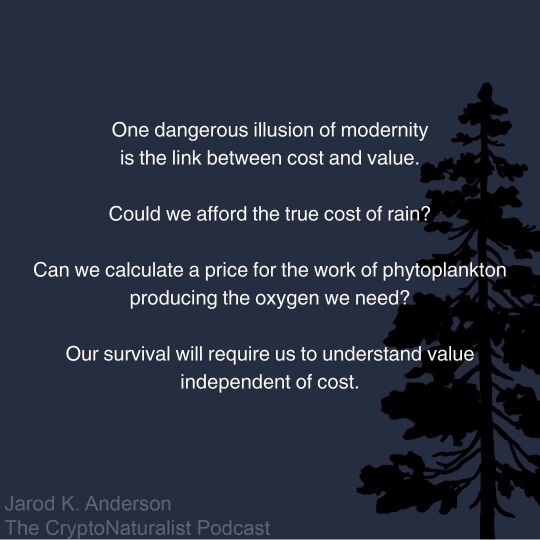
One dangerous illusion of modernity
is the link between cost and value.
Could we afford the true cost of rain?
Can we calculate a price for the work of phytoplankton producing the oxygen we need?
Our survival will require us to understand value
independent of cost.
129 notes
·
View notes
Text
Ahh, nothing like the existential threat and reality of climate change to fuel some good old fashioned anxiety from an early age.
102 notes
·
View notes
Quote
Examples of positive change are elusive, not because positive change doesn't exist, but because it does not capture our attention and fails to meet media criteria for news
Sarah Jaquette Ray
389 notes
·
View notes